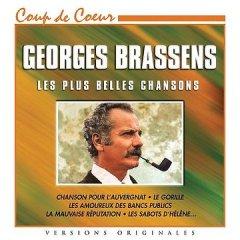Georges Brassens - Les plus belles chansons (2010)
Georges Brassens - Les plus belles chansons (2010)

1.Georges Brassens — Une jolie fleur 2.Georges Brassens — Marinette 3.Georges Brassens — Le petit cheval 4.Georges Brassens — Le Mauvais Sujet Repenti 5.Georges Brassens — Le gorille 6.Georges Brassens — La prière 7.Georges Brassens — Les Amoureux Des Bancs Publics 8.Georges Brassens — Chanson Pour L'auvergnat 9.Georges Brassens — La Chasse Aux Papillons 10.Georges Brassens — La Mauvaise Réputation 11.Georges Brassens — Auprès De Mon Arbre 12.Georges Brassens — Les Sabots D'hélène
Brassens was born in Sète in southern France, and served in forced labour camps during the Nazi occupation in World War II. He began writing songs at an early age but did not start performing as a solo artist until much later, overcoming his shyness to begin working the Parisian club circuit in the early 50s in an attempt to place his songs with other performers. His breakthrough arrived in 1952 when he played a late night audition for the cabaret singer Patachou. She convinced him to work the circuit as an artist in his own right, and Brassens proved to be an immediate success with the sophisticated cabaret audiences. He began recording in 1952 and his very first single (the anti-death penalty ‘Le Gorille’) set out his deeply humanistic political stance.
Songs poured out of Brassens during the rest of the decade. Reportedly, he appeared in public performance in France once every three years, singing 10 songs written in the interim. His satirical streak often led to bans on French radio but only helped to further his appeal with the general public, who were drawn to his disarmingly simplistic musical style and witty, subversive lyrics. Brassens was less prolific during the 60s and 70s, due in the main part to a serious kidney ailment which would affected his health from the late 50s until his death. On 28 October 1973 he gave his first performance outside France, appearing in concert at the Sherman Theatre in Cardiff, Wales. The BBC filmed the concert and excerpts were screened in a 1975 television documentary about his life. Owing to Projet Brassens, a website dedicated to his life and work, this artist’s work is gradually becoming better known several decades after his death.
Several of Brassens’ songs have appeared in films, sometimes as themes, and he also appeared infrequently on the screen. He appeared in a small role in Porte Des Lilas (1957) and ‘Les Copains D’Abord’ was the theme song for Les Copains (1964). After his death his music continued to be heard in films, sometimes through the use of his recordings: ‘Maman, Papa’ in Portraits Chinois (1996, US title: Shadow Play) and ‘J’ai Rendezvous Avec Vous’ in L’Amour Est À Réinventer (1996, US title: Love Reinvented), ‘Le Temps Ne Fait Rien À L’Affaire’ in Le Dîner De Cons (1998, US title: The Dinner Game), where it is heard as the title theme. His song, ‘Don Juan’, was in Confession D’Un Dragueur (2001), another was used as the theme for Reines D’Un Jour (2001, US title: A Hell Of A Day), and ‘Il N’y A Pas D’Amour Heureux’ was in 8 Femmes (2002, US title: 8 Women). Brassens also appeared occasionally on French television, including On Vous Écrira (1961) and Émilie Jolie (1980). --- Colin Larkin, The Encyclopedia of Popular Music
download (mp3 @320 kbs):
uploaded yandex 4shared mega solidfiles zalivalka cloudmailru filecloudio oboom uplea








